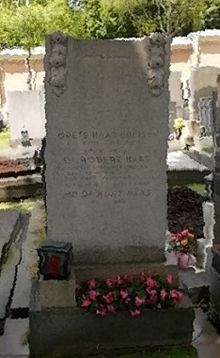Robert Haas (musicologist)
Robert Maria Haas (born August 15, 1886 in Prague , Austria-Hungary , † October 4, 1960 in Vienna ) was an Austrian musicologist and conductor .
Life
Robert Haas studied musicology in Prague, Berlin and Vienna and was awarded a doctorate in Prague in 1908. phil. PhD. For some time he was Guido Adler's assistant at the Vienna Music History Institute and then embarked on a career as a conductor . In 1920 he took over the management of the music department of the Austrian National Library . Haas was the first to publish a complete edition of Anton Bruckner's symphonies in the 1930s . He wrote two volumes for the multi-volume handbook of musicology by Ernst Bücken .
Haas had been a member of the NSDAP since 1933 , which apparently was a disadvantage for him in Austria before the annexation of Austria . There are reports of allegiances loyal to the leader and anti-Semitic from Haas. After the war he was no longer permitted to teach.
His grave is in the Hernalser Friedhof (R-49A) in Vienna.
Publications (selection)
- Beethoven's death. From an unknown correspondence , in: Der Auftakt , vol. 3 (1923), booklet 2, pp. 48–50
- Gluck and Durazzo in the Burgtheater , Vienna 1925
- The Vienna Opera , Vienna 1926
- Viennese musicians in front of and around Beethoven , Vienna, Prague, Leipzig 1927
- The Estensian music , Regensburg 1927
- Die Musik des Barock , Potsdam 1928 (= Handbook of Musicology , edited by Ernst Bücken , Volume 3)
- Anton Rösler's Requiem for Mozart , Eger 1930
- Performance practice of music , Potsdam 1931 (= Handbuch der Musikwissenschaft , edited by Ernst Bücken , in conjunction with Heinrich Besseler , Volume 8)
- Wolfgang Amadeus Mozart , Potsdam: Athenaion 1933
- The great masters of music - Anton Bruckner , 1934, reprint Laaber, 1980
- Bach and Mozart in Vienna , Vienna 1951
literature
- Uwe Harten: Haas, Robert Maria. In: Oesterreichisches Musiklexikon . Online edition, Vienna 2002 ff., ISBN 3-7001-3077-5 ; Print edition: Volume 2, Verlag der Österreichischen Akademie der Wissenschaften, Vienna 2003, ISBN 3-7001-3044-9 .
- Entry on Robert Haas (musicologist) in the Austria Forum (in the AEIOU Austria Lexicon )
Web links
- Literature by and about Robert Haas in the catalog of the German National Library
Individual evidence
- ↑ Pamela M. Potter: The most German of the arts. Musicology and society from the Weimar Republic to the end of the Third Reich. Stuttgart 2000, p. 153. There it says in connection with the filling of the position of Robert Lach : »By choosing Haas as the best candidate, the commission took into account the inconvenience to which he was exposed as a National Socialist in Austria before the Anschluss . Party member since 1933, his political convictions had allegedly prevented Haas from advancing to the Vienna National Library and gaining positions in Vienna, Graz and Innsbruck, even though he was one of the top applicants there. During his publication of Bruckner's works he led a difficult discussion of “Jewish business interests”; a situation that was "decided in his favor by our Führer Adolf Hitler in 1936". His attitude in Vienna would have given him the opportunity to compensate for all that he had suffered for his unwavering devotion to National Socialism. "Potter cites the source:" Report on the commission meeting on December 15, 1938 "; Lach, “Casting Proposal,” June 19, 1939; Curriculum vitae Haas, University Archives Vienna Dean's office 240
- ^ Matthias Pape: Erich Schenk - an Austrian musicologist in Salzburg, Rostock and Vienna. Music historiography between the Greater German and the Little Austrian state idea , in: Die Musikforschung , 53rd vol., 2000, p. 425.
| personal data | |
|---|---|
| SURNAME | Haas, Robert |
| ALTERNATIVE NAMES | Haas, Robert Maria |
| BRIEF DESCRIPTION | Austrian musicologist and conductor |
| DATE OF BIRTH | August 15, 1886 |
| PLACE OF BIRTH | Prague |
| DATE OF DEATH | 4th October 1960 |
| Place of death | Vienna |
